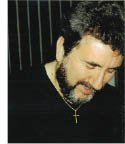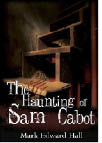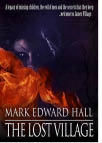The Holocaust Opera (13 page)
Read The Holocaust Opera Online
Authors: Mark Edward Hall
Tags: #Opera, #Holocaust, #evil, #Paranormal, #Music, #Mengele, #Mark Edward Hall, #Nazi Germany

The executioner, still standing over me, sensed that something not of his making was about to transpire. I saw the knowledge in his cruel eyes in the moment before he raised both his arms above his head, the hunting knife tightly fisted and poised viciously. From the archway behind him stood the devoured, writhing at the gates, desperate to reach their executioner, eager to exact their revenge, so close now that I could almost touch them, but still trapped in the past.
I was shaking with rage and terror, understanding that my life was about to end. It did not matter. Mengele had been right about one thing, at least. This was not about me. It was about all of the souls that had been lost for so long in the shadows. My life, this life, was not real. It never had been and it probably never would be. As the knife began its descent, Jeremiah played, and I opened my mouth and sang into the darkness, defiantly belting out the lyrics to a song that I instinctively knew. I sang directly into the monster’s face, knowing that the only thing that mattered in that moment was the music and those it could set free:
There’ll be no more offerings, no more sacrificial lambs,
There’ll be no more obedience, no atonement, no negotiations, decrying the unfairness of,
Generations dying in the ovens of hatred,
Abraham’s deference to a god gone mad, a deity of submission,
Is long passed,
From depths of darkness’ void, the anguished voices shall be heard,
And rise triumphant to take a final stand,
For mercy shall not be begged and we will live in honor, not favor,
And never again ask, as we have in ages past,
Why we were victims of some madman’s dream,
Not in this life, nor the lives that await beyond the door, not ever, ever again...
Amen.
As the final notes of the song rang out, the writhing legions of lost souls beyond the door broke through. I knew that the song—Jeremiah’s and my song—had been the catalyst necessary for the transformation. The executioner’s knife never finished its descent. The ram-thing that had once been Josef Mengele was devoured in a whirlwind of angry ectoplasm and he did not go quietly, for the roar of his disapproval as he was swept away by the tide, was deafening, shaking the rafters above me. I twisted my head around in time to see Aaron and Eva Gideon crumble into dust. The air around me twisted and whirled, picking up the combined ashes of the executioner, the Gideons and all the lost souls that had managed to make it through the doorway. The air was hot and thick and swirling with ash.
I was no longer naked nor bound to the floor. I scratched my way to my feet amid the ashes of the dead and ran to meet Jeremiah as he rose from the piano bench. I latched onto him and squeezed for all I was worth, so afraid that he would not feel me, terrified that I was not real, that any second I, too, would crumble to ashes and be forgotten as had so many souls throughout mankind’s brutal history. Jeremiah hugged me back, affirming my solidity. We stood holding each other, crying.
The hot ashes were quickly cooling now, and condensing, swirling in the room like fine mist.
Some sort of transformation was in play. The ashy mist seemed to be eroding the room’s features, and particles of it had morphed into ice crystals. Beyond the archway, however, the terrible past had disappeared and the kitchen had come back into focus, inviting in its stark reality. At the very end was the door, and waiting beyond it, freedom.
There was no time now to ponder the profundities of what had happened here. I understood that we needed to get out of the building fast. I took Jeremiah’s hand and together we ran beneath the archway and through the kitchen to the door. We stopped for one final look back, however, at the turmoil we’d left behind. The cold fog and ice particles that moments ago had been the ashes of the condemned were being whipped into an angry cyclone. The cyclone was in the process of picking things up—dust particles, loose papers, small solid objects—now, all stirring into the whirlwind, strengthening the maelstrom by degrees. The cold was deepening as well. My teeth were literally chattering together.
Jeremiah slammed open the door and we bolted down the hallway, then the stairs, taking them in bounds, joyous in our triumph of freedom. From behind us came the sounds of angry whispers that seemed to be gaining in decibels as the force behind them grew in intensity. Throwing the door open to the outside, we ran out into the night.
Above us, windows began to blow out, jagged shards of glass and splintered sash works rained down onto the sidewalk and into the street. As quickly as the debris was being thrown out of the building, it was being picked up and fed back into the ever-increasing cyclone. I felt my body and perhaps even my soul being drawn back into it. I fought its influence, knowing that now I possessed the power to do so.
The conspiratorial voices from within the building were strengthening along with the intensity of the maelstrom, growing to an angry crescendo—some sounding like animals, others strangely human.
Jeremiah took me by the hand and together we moved quickly out of harm’s way. A block or so down, we stopped and looked back. The entire building had become a hive of noise and oddly diffused light. Now fire had become a part of the mix—angry licks of it were shooting from windows and skylights, catching timbers and siding on fire even as the building began to collapse in on itself.
There were no neighbors exiting the nearby buildings to see what all the commotion was about. There were no curious pedestrians standing in the streets gazing in awe at the tumult. As far as I knew, no fire or police departments had been summoned. I was not surprised that Jeremiah and I were the lone witnesses to this oddly contrived drama. It was our battle, after all. Others could not see it because they had not lived it. Perhaps later, after it was over, they would discover the building’s loss, comb the ashes, and come to some learned and logical conclusion as to its cause. They would just skim the surface, of course, as unwilling to see the truth beneath the chaos as twentieth-century man had been to find the root cause of the holocaust.
Several blocks down, the noise finally abated, but now, a new sound was coming into play: music.
“Oh, God,” I said. “What time is it?” Jeremiah looked at his watch and confirmed my suspicions. It was 6:00 PM and it seemed that from every building we passed along the way came the magnificent sounds of symphony. Its joyous sound literally filled the air. Jeremiah and I recognized it immediately, of course: it was
The Holocaust Opera,
our very own souls singing the praises of liberation for a nation no longer shackled to its tragic past. The metropolitan airways had taken to the opera, it seemed, like birds take to wing. People were now passing us along the way and there was song on their lips and hope in their eyes. I saw no suicides, no mass hysteria, and no chaos.
If I was to believe all that had happened, then I would have to accept that I had been a simple victim of chance, that through some twisted sleight of hand the soul of a murdered innocent had become bound to this person I call self. If I was to believe all that had happened, then I would have to accept that Jeremiah was the son of a dark angel sent here by forces beyond my understanding to erase the name of man from the book of life. I nearly laughed at the absurdity of it. Who would ever believe such claims? I believed. I
knew.
So did Jeremiah. We were not of this place. This was an incontestable truth. We were both freaks, interlopers in a world gone slightly off center, a world, well, a world full of...freaks. Perhaps we weren’t so alone after all. The thought comforted me.
The air filled suddenly with falling snowflakes, a city-wide cleansing of white, fitting in its purity. Tears streamed down Jeremiah’s cheeks as he gazed up into the falling snow.
“We should go,” he said, and I did not press him for explanations as to where. Perhaps I would later, but not now. This moment was ours to savor and it was enough for me just to be at his side. I could barely see him through the snowy air. I knew he was there. I could feel him, solid and warm against my body. I brushed a hand across his cheek and kissed him tenderly on the mouth.
He continued to stare toward the heavens. I looked up, too, at the falling flakes, each an individual and complex pinwheel of white in a sea of infinity, all destined to be a part of the whole, steadfast, everything in its place, as it should be. I understood this for the first time, and despite the madness that had plagued our lives for so long, everything seemed suddenly okay. Not perfect, but okay. We had our lives, fragile as they might be; and in a world so filled with loss and rage, fear and hate, there was hope. That, at least, was something to be thankful for.
About the Author:
Mark Edward Hall lives in Richmond, Maine with his wife, Sheila. He is currently at work on a new book.
Also by Mark Edward Hall:
 The Haunting of Sam Cabot
The Haunting of Sam Cabot
by Mark Edward Hall
Print ISBN: 9781615720309
Horror, Psychological
Novella of 28,436 words
There are places that hold evil, houses so vile, so tainted, that people refuse to live in them. Farnham House is one of those places. Once an inn, this majestic old New England manor house is back on the market, and the price is very reasonable. Sam Cabot is a man tired of moving. Now he wants nothing more than to live a quiet life in the country with his wife and young son. Little does he know that he will soon begin a long, slow descent into madness and that he will spend his summer living with dead things.
 The Lost Village
The Lost Village
by Mark Edward Hall
Print ISBN: 9781615721863
Horror, Vampire
Novel of 256,448 words
Sarah Jameson Landry and her five year old daughter, Annabelle, haunted by the same insistent voice, embark on a reluctant journey to find their ancestral home. They discover a strange little village that somehow went adrift from the rest of the world. They uncover a horrifying legacy of missing children dating back hundreds of years, and learn the terrible secrets of their own ancestral past.
Michael Bannon, haunted by his own demons has come to James Village in search of anonymity. He finds distance cannot erase the terrible mistakes of the past. He discovers also that he is connected to Sarah and Annabelle. They form an alliance with a small group of friends and villagers, who are tired of being afraid, and resign themselves to the task of seeking the. Together they embark on a terrifying quest to destroy the evil that lies at the center of all their lives.
